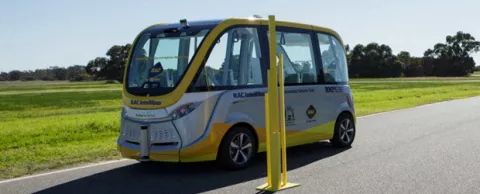
We will indeed shape the future of autonomous and connected vehicles in the coming years through research, development, policy making and piloting. But thereafter, this technology is likely to shape us!
How we evolve the dialogue on autonomous and connected vehicles, who we bring to the table to participate, and how we view the opportunity, is an important agenda for the Council. With pilots underway in the region, we are beginning to understand our strengths and weaknesses as policy makers, technologists and city builders. As an early leader in Australia’s autonomous vehicle landscape, the Royal Automobile Club of Western Australia is hungry for more. In this article, we hear about their recent interests to continue their investment in intelligent transportation systems. — Adam Beck
The Royal Automobile Club of Australia (RAC) has been heavily involved in the autonomous vehicle field. The auto club put what it says is Western Australia's first driverless electric shuttle, the RAC Intellibus, on the road in South Perth last summer. It also has conducted extensive research on the benefits of the vehicles and on the level of road and related infrastructure costs.
RAC recently submitted a proposal to a Federal parliamentary committee on industry, innovation, science and resources asking for the government to invest $300 million in intelligent transportation systems and more vehicle testing.
Beneficial? Yes. Expensive? Yes, that too
In its submission, the RAC said "Research suggests that AVs could deliver many benefits including improved mobility and independence for many and reduced crash risk and severity by removing human error for instance.
"Conversely, increasing automation does also raise many potential considerations that will need to be explored, including such issues as system failures, cybersecurity, and liability in the event of crashes.
For the RAC, additional driverless vehicle testing will provide a better understanding of the benefits the technology likely has in terms of standards and vehicle design. Further testing also will increase citizen awareness of them. To that end, the RAC will continue its South Perth trial to give more people the opportunity to use the shuttle bus and share their opinions on the technology.
A collaborative effort needed
The RAC submission also added its voice to an initiative many governments, manufacturers and other stakeholders have been calling for: close collaboration and cooperation between all levels of government, local, region, state and federal. It will be essential for Western Australia and the rest of the country to experience the most benefits from autonomous vehicle technology, the RAC submission said.
"Government at all levels will have a leading role in shaping the future with autonomous vehicles. A well-considered roadmap will be essential to facilitate the safe transition to AVs on to our roads and maximise the benefits through ensuring they form part of an integrated transport system. To achieve this, investment in intelligent transport systems will be crucial to ensure that AV technology can be integrated with new and existing infrastructure."
Doug Peeples is a writer specializing in technology and energy. Follow @smartcitiesanz on Twitter.



